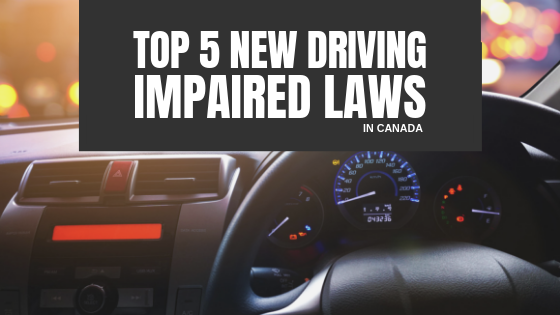As of December 18, 2018, the impaired driving laws in Canada have become some of the toughest in the world. It is essential that all drivers know the new state of the law and the jeopardy they could possibly face. Here’s a look at the top 5 issues to consider about the new impaired driving laws in Canada …
1. Every driver can be compelled to provide a roadside sample, and the police do not need a specific reason to ask for it. Formerly, an officer requesting a roadside sample was required to have a reasonable suspicion that the accused had alcohol in their body. Now, all the demanding officer needs is a roadside device on them. They don’t need an odor of alcohol or an admission of consumption, but rather simply to have the roadside device in their possession. That alone will be all the officer needs to require a roadside sample.
2. Do not refuse the roadside sample, even if you haven’t been drinking. The current law is certainly questionable, but until the courts strike it down, it is a valid law that must be followed. The minimum sentence for a refusal is $2,000. That goes for the breath demand at the station as well. Refusal in the face of a valid breath demand at the station will result in a minimum penalty of $2,000. The offense also carries a mandatory minimum driving prohibition of one year.
3. If you are convicted of impaired driving, on a first offense, the minimum fines have increased. Readings between .08-.119 will attract a $1,000 fine, and .120-.159 will now see a minimum fine of $1,500. Blow twice the legal limit or more and face a fine of $2,000. A minimum 12-month driving prohibition accompanies these fines.
4. It’s not all bad. The new impaired laws provide avenues for creative sentencing. With the consent of the crown, sentencing can be delayed for the completion of a rehabilitation program. Once proof is provided to the court, it is open to the defense to argue for sentences that fall below the mandatory minimums, including the driving prohibition.
5. The new law does not require any minimum period of driving prohibition. Currently, the minimum driving prohibition upon conviction is 3 months in Ontario – with the Stream A interlock program. Under the new laws, that 3-month wait is no longer mandatory. At this time, though, our provincial government has not put a program in place to allow for anything earlier than 3 months, which means that we can’t take advantage of this clause just yet.
The best defense is to always take a cab, get a ride, call a friend, and plan ahead. However, if you or someone you know has been charged with impaired driving, then the best defense is a call to Millars Law. Our team of lawyers is ready to fight for the best result.
By Nick Cake for Millars Law







